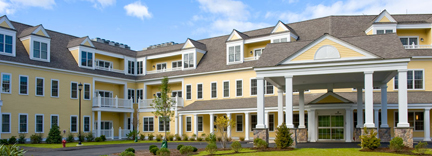In the wake of the recent bankruptcy and sale of The Groves, two officials answered questions about the current state and future of the senior living complex at a Lincoln Council on Aging session this week.
The Groves, which opened three years ago but is at only 59 percent occupancy today, filed for bankruptcy in March 2013 after defaulting on payment of $88.4 million in tax-exempt bonds issued by the Massachusetts Development Finance Agency. According to Senior Housing News, Benchmark Senior Living emerged as the “stalking horse” among numerous potential bidders and received court approval to acquire the property for up to $35 million. The sale was completed in June.
A 2012 analysis commissioned by Masonic Health Systems of Massachusetts (MHS), the previous co-owner of The Groves along with New England Deaconess Association, noted that slow sales were exacerbated by “an inordinate number of cancellations of reservations” and said units were overpriced. For residents who needed more help, the Groves offered discounted services from a visiting nurse association owned and operated by MHS, or a transfer arrangement to the Alzheimer’s care and nursing facilities at Newbury Court in Concord, also at discounted rates.
“While the virtual/in-home care concept was cutting edge, it was possibly ahead of its time, and somewhat beyond many consumers in the market that wanted—or believed they needed—to see ‘bricks and mortar’ long-term care facilities on campus, as is the case at The Grove’s competitors,” the consultant’s report said.
With the planned addition of skilled nursing and memory care facilities, The Groves is changing from an assisted living community to a CCRC (continuing care retirement community) that will offer every level of care on its campus adjacent to Route 2, said Sandra Van Allen-West, regional sales director for Benchmark, which owns 46 other senior living communities in New England, including 21 in Massachusetts.
The town has approved a plan to build those facilities on part of the campus that was originally intended for second-phase construction of more independent living units. The Groves currently includes 168 units in two apartment-style main buildings and 38 cottages.
When they move in, residents will be required to enter into a “life care contract” that guarantees that their monthly fee will not go up if they need to move from their independent living unit to a higher level of care at The Groves, Van Allen-West said. The only competitor in the area that offers a similar arrangement is Brookhaven at Lexington, she added.
“That’s a key component to attract more people,” said Rob Fallon, executive director at The Groves, adding that “we lost a lot of people” who moved out because they began to need more care than The Groves or visiting services could provide.
In another change at The Groves, residents will now be required to purchase a dining plan with at least 30 meals per month, Van Allen-West said.
Depending on the size and style of their unit, Groves residents pay an entrance fee of $450,000 to $900,000. After residents die or move out, up to 90 percent of that fee is refunded once their specific unit is resold or after 10 years, whichever comes first. Incoming residents are more likely to buy a vacated unit rather than one that’s never been occupied because the vacated units (since they were taken first) are the most desirable in terms of view or other features, Fallon said. “My experience in this industry is that the popular ones sell out,” he said.
There’s also a monthly fee of $4,000 to $6,000 per person plus another $1,400 for a second person living in a unit. That fee rises for all residents by 3 to 4 percent a year, though it wouldn’t increase solely if a resident moves to a higher level of care, Van Allen-West said. The “off-the-street” monthly fees for skilled nursing care ranges from $12,000 to $16,000, she added.
With the addition of the new facilities, “I feel very confident that we’ll achieve full occupancy and create a strong waiting list” within two to three years, Fallon said.
The Groves includes 168 apartment-style units in two main buildings and 38 cottages.
Benchmark, although a separate business entity from The Groves, is honoring the contracts of residents who were living there at the time of the ownership transfer, Van Allen-West said. She acknowledged that the refund promise isn’t as iron-clad as a government-backed guarantee, “but it’s very important for us for this project to be successful,” she said. “You have to look at Benchmark as an organization and what it historically provides.”
Attendees at the COA session asked a number of pointed questions, including one from a man who commented on Van Allen-Wests’s comment that Benchmark is listed as one of the Boston Globe’s Top 100 Places to Work.
“I’m appalled at the reputation Benchmark has,” he said, referring to a number of negative comments about the company by Benchmark employees on Indeed.com. “I can’t believe that a company would allow this to happen.”
“There will always be people who are unhappy or disgruntled,” Van Allen-West responded. “There is a platform for them to have a conversation and get their issues addressed.”
The bankruptcy and sale to Benchmark “is good news for The Groves, the residents and the town ,” Town Administrator Tim Higgins said at the June 17 Board of Selectmen meeting. “It’s our leading taxpayer in town,” generating about $750,000 in tax revenue in 2013, and if the facility fills up,”we could see annual taxes to the town almost double,” he said.

